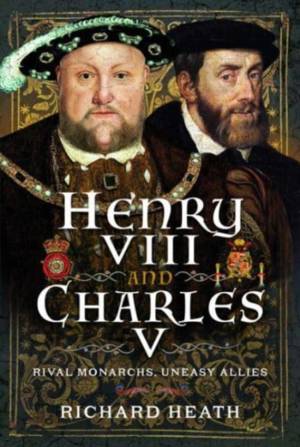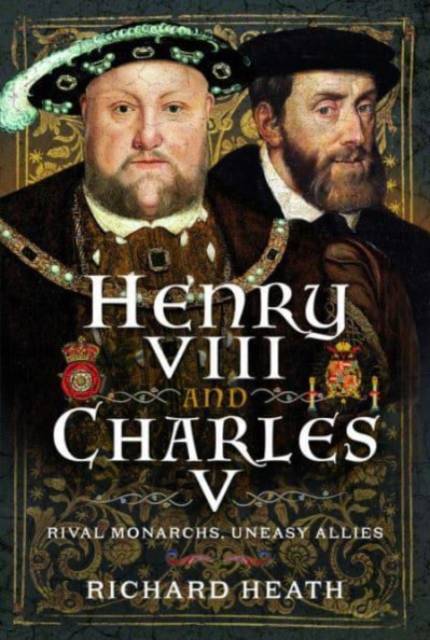
- Afhalen na 1 uur in een winkel met voorraad
- Gratis thuislevering in België vanaf € 30
- Ruim aanbod met 7 miljoen producten
- Afhalen na 1 uur in een winkel met voorraad
- Gratis thuislevering in België vanaf € 30
- Ruim aanbod met 7 miljoen producten
Zoeken
€ 30,95
+ 61 punten
Omschrijving
King Henry VIII and Emperor Charles V both ruled for almost forty years at a time when momentous changes in society, politics and religion were taking place in England and across Europe. Richard Heath takes a fresh look at these two individuals and the importance of their relationship in determining both their immediate policies and the future of their lands.
Although always rivals for status, Henry and Charles, despite their very different temperaments, had much in common. Both had been brought up as devout Christians and in the chivalric tradition. Ties between their lands (by 1520 Charles was Holy Roman Emperor as well as ruling Spain, the Low Countries and much of Italy) were close. There were alliances against a common enemy, France, valuable trading links and a personal connection - Henry was married to Charles' aunt, Catherine of Aragon.
The book provides a clear account of their complex and ever-changing relationship, both personal and political. It reveals the goodwill that existed between them, particularly during Emperor Charles' lengthy state visit to England in 1522. It also shows how this proved impossible to maintain once Henry decided to end his marriage to Catherine and his subsequent rejection of papal authority. On the occasions when they planned military action together their alliance collapsed in mutual recriminations. Yet they were officially at war for only a few months and their armies never faced each other.
The duplicitous world of international diplomacy, with dynastic marriages, fine words and broken promises, provides the backdrop to this fascinating story. In their search for honor and dynastic security, so important to both monarchs, the decisions of one could rarely be ignored by the other.
Although always rivals for status, Henry and Charles, despite their very different temperaments, had much in common. Both had been brought up as devout Christians and in the chivalric tradition. Ties between their lands (by 1520 Charles was Holy Roman Emperor as well as ruling Spain, the Low Countries and much of Italy) were close. There were alliances against a common enemy, France, valuable trading links and a personal connection - Henry was married to Charles' aunt, Catherine of Aragon.
The book provides a clear account of their complex and ever-changing relationship, both personal and political. It reveals the goodwill that existed between them, particularly during Emperor Charles' lengthy state visit to England in 1522. It also shows how this proved impossible to maintain once Henry decided to end his marriage to Catherine and his subsequent rejection of papal authority. On the occasions when they planned military action together their alliance collapsed in mutual recriminations. Yet they were officially at war for only a few months and their armies never faced each other.
The duplicitous world of international diplomacy, with dynastic marriages, fine words and broken promises, provides the backdrop to this fascinating story. In their search for honor and dynastic security, so important to both monarchs, the decisions of one could rarely be ignored by the other.
Specificaties
Betrokkenen
- Auteur(s):
- Uitgeverij:
Inhoud
- Aantal bladzijden:
- 232
- Taal:
- Engels
Eigenschappen
- Productcode (EAN):
- 9781399084574
- Verschijningsdatum:
- 8/02/2023
- Uitvoering:
- Hardcover
- Formaat:
- Genaaid
- Afmetingen:
- 155 mm x 234 mm
- Gewicht:
- 556 g

Alleen bij Standaard Boekhandel
+ 61 punten op je klantenkaart van Standaard Boekhandel
Beoordelingen
We publiceren alleen reviews die voldoen aan de voorwaarden voor reviews. Bekijk onze voorwaarden voor reviews.











